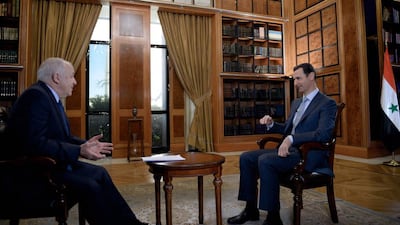BEIRUT // Damascus receives information about the US-led coalition’s airstrikes against ISIL in Syria, president Bashar Al Assad said on Tuesday.
“Sometimes, they convey a message, a general message,” he said in an interview with the BBC in Damascus.
“There is no dialogue. There’s, let’s say, information, but not dialogue.
“There’s no direct cooperation,” said Mr Al Assad, adding that the messages came to Damascus through third parties.
“More than one party, Iraq and other countries. Sometimes they convey messages, general messages. But there’s nothing tactical,” he said.
Damascus has grudgingly accepted the airstrikes against ISIL in its territory that began on September 23 last year, but has repeatedly criticised the coalition for failing to coordinate with it.
Syrian officials say the raids cannot defeat ISIL unless the international community starts co-operating with Syrian troops on the ground.
But Washington has ruled out co-operating with Mr Al Assad’s government against ISIL, and the Syrian leader has said Damascus had no interest in joining the coalition.
“No, definitely we cannot and we don’t have the will and we don’t want [to], for one simple reason — because we cannot be in an alliance with countries which support terrorism,” said Mr Al Assad.
The comment appeared to be a reference to coalition support for other rebels groups fighting to overthrow him, all of whom Mr Al Assad’s government views as terrorists.
Mr Al Assad said US officials “easily trample over international law, which is about our sovereignty now. So they don’t talk to us, we don’t talk to them”.
More than 210,000 people have been killed in Syria since the conflict began with anti-government protests in March 2011.
Human rights groups have accused Damascus of indiscriminately killing civilians in airstrikes on rebel-held areas, using unguided munitions such as barrel bombs.
But Mr Al Assad denied that the army was using the makeshift bombs. “I haven’t heard of [the] army using barrels, or maybe cooking pots,” he said, dismissing claims that his forces were using indiscriminate weapons.
“There are no indiscriminate weapons. When you shoot, you aim. You aim at terrorists in order to protect civilians,” said Mr Al Assad.
The Syrian president also denied claims that his government had used chemical weapons against its own people in August 2013, in an attack outside Damascus that killed about 1,400 people.
“Who verified who threw that gas on whom?” he asked.
Asked if his government was responsible, Mr Al Assad said “definitely not”, and said the reported death toll was exaggerated.
Meanwhile, Syrian activists on Tuesday accused Jaysh Al Islam, a powerful militant group based near Damascus, of detaining a group of their colleagues, in what they said was the latest in a string of abuses.
“An armed group believed to be loyal to Jaysh Al Islam stormed the office of Erbin’s local [activist] committee. It kidnapped the team there and took them to an area near the front line,” said the Local Coordination Committees activist group.
The armed men also “seized and destroyed the Erbin committee’s equipment”, said the group.
Its statement came a day after the Erbin committee announced via its Facebook page that its office had been broken into.
An LCC spokeswoman said that six activists had been taken from their office on Monday, while the Erbin committee said one had since been set free.
According to the Erbin committee’s Facebook page, the unnamed activist who was released said his detained colleagues “are being held in isolation from each other, in solitary confinement”.
LCC spokeswoman Majeda, who refused to be identified with her full name for fear of reprisals, said the latest detention was part of a campaign by Jaysh Al Islam to “empty the revolution of its true activists”.
* Agence France-Presse

